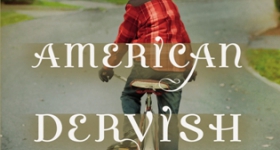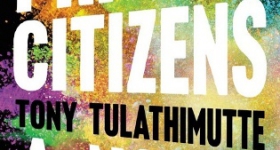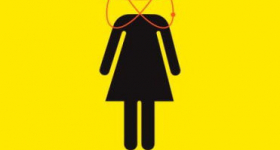While Christine Hyung-Oak Lee's story "Permission to Marry" doesn't seem obviously linked to the theme of "R/Evolution," a closer read of the story sees the many ways in which the parents -- and their younger generation -- have to constantly re-evaluate how to deal with their changing world and the small rebellions they enact in the face of these changes. History and memory play a big role in her characters' lives. We invited her to read a small excerpt of the story, and then sat down and asked her a few questions.
Can you tell me a little bit about where this story came from?
Someone close to me got engaged a few years ago—and I witnessed myriad reactions to the engagement and ensuing wedding. These responses ran the gamut; anywhere from super-supportive to all-out protest. In some crazy way, people thought they had control over the destiny of this provocative couple. And they brought their egos and scars into a battle they could never win. So I decided to investigate the particulars of the situation, and in doing so, imagined a narrative for "Permission to Marry."
I love that this story centers so heavily on the point of view of the two elderly parents. While the parents aren’t painted as entirely sympathetic, there is a measured tenderness you show towards them, something that is helped by the fact that we’re in their heads all the time. Can you talk a little bit about your feelings towards your characters in this piece, particularly the two parents?
People are flawed and there are root causes for our mistakes and shortcomings.
The above is something I learned as a teacher—student errors have patterns and causes behind them. There is reason to most madness, at least from my experience.
Mr. and Mrs. Shin are rigid and rule-based people—but without such stalwartness, they might not have survived the Korean War. And because one formula worked for them throughout such upheaval and trauma, they are in the habit of applying it to all things. They are stuck on doing things one way, because they don’t see another way to live. They don’t see another way to survive, and they’re not interested in looking at other paths in life. They’re not into taking chances. We see how that unfolds in the story as it pertains to their child’s engagement.
Also, the Shins operate from a place of fear. And this story was a way for me to examine the ways in which we do operate from a place of fear, and the destruction that doing so causes.
So the Shins are messed up. But not without reason and cause. Because they’re human.
There’s a strong emphasis on backstory in this piece – enough that we as readers realize that the issues the Shins have with their son’s engagement have little to do with present reality, and more to do with their own ghosts and hang-ups, especially as immigrants who have survived hardship. What are your thoughts on that incongruity, either within the story or in real life? Do you believe we’re all haunted by these ghosts, even as a younger generation?
I don’t know if I can speak for all people and say we’re all haunted. But I certainly am. PTSD is a part of my life. You can’t survive a war (or immigration or other trauma) and not have it haunt you, forever—or at the least, a very long time.
I have a birthmark on my wrist. No big deal for most. But to me, it’s an identifying marker should I be separated from my loved ones for a span of decades and then be reunified. This can only come from being part of a family who was separated during the Korean War.
And to that end, my own parents transferred their wartime PTSD onto me—for better and for worse. For better, because in an Apocalypse, I will probably get a posse together in ten seconds and survive. For worse, because I keep thinking about the Apocalypse. I mean, when I see a tree and a wild turkey, I think “Wow, that’s nice. Nature.” And then immediately, I see a source for lumber and food. In that sense, my innocence is gone.
And in the case of my parents’ PTSD, I have no visual for what it is that haunts me. It’s my parents’ ghost, and it’s never been given a face.
I certainly think these ghosts are why I write—to give the ghosts and monsters faces in stories.
And then there are traumas that don’t have to be caused by immigration or war survival. For example, most of us have gone through a bad breakup. It can scar you. Make you tender. Make you hesitate. Even if you meet the person who is the best match for you, you’re likely going to balk if you’ve been hurt before.
And again, one of my students was in a car accident. She’ll never see that intersection the same way again. And yet for other people, that intersection is barely a blip in their psyche.
So in that way, we all have backstory that affects our ongoing life narrative.
Stepping away from the story for a bit: as the fiction editor for the Asian American literary journal Kartika Review, you’ve seen a wide range of APIA literature. What trends have you seen emerging over the last few years in the scene? What about this new generation of Asian American writers excites you most?
I’m actually seeing trends dissipate. Gone are the focus on immigration and family stories—and even in these venues, the experiences are varied and multi-layered. I like that APIA literature is diversifying. We’re writing outside our race. We ourselves are diversifying and having different experiences and bringing those stories to the table. I love seeing writers of Hmong and Cambodian descent. I love that hapa writers are identifying as APIA, too.
Who are some of your biggest artistic influences?
I’ve spent many hours staring at Rothko’s works in museums. I saw his Seagram Murals at the Tate Modern, and they have never ever left my mind. They look like razor blades—they’re blood red and black and dark dark dark. If my darkness, into which I go to write, had a visual appearance, it would be those Seagram Murals.
While I write, I listen to the music of Jónsi and if not Jónsi, anything without lyrics at the forefront.
As for literature, Haruki Murakami’s work always inspires me with his disregard of rules and total non-writing-workshop style. Junot Díaz, whose voice reigns supreme. Nicole Krauss for her novel structures and beautiful characters. F. Scott Fitzgerald for writing my favorite novel of all time, The Great Gatsby.
I read poetry when my prose feels stuck. Li-Young Lee’s work always unglues me.
And ultimately, Margaret Cho. Because funny and pioneer—in the end, as an artist, you have to entertain with courage.










Comments